An
interview with Maria Simma of Austria
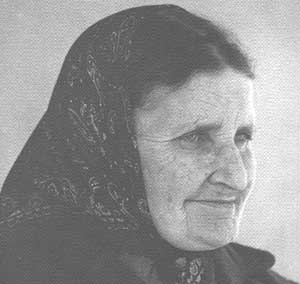 |
|
Maria
Simma (1915-2004)
|
Today, very little is taught in regular catechism classes about
Purgatory, about the suffering that the Poor Souls experience in order
to be completely purified to be able to enter into the Kingdom of
Heaven. Yet Purgatory does exist, and the sufferings that the Poor Souls
experience there are very real.
Since 1940 (she was then aged 25), a privileged soul, named Maria Simma,
has had regular visits from the souls in Purgatory to explain their
sufferings and to ask for prayers and Masses to be released from
Purgatory. Her local Bishop and parish priest told her she could make
known these visitations as long as there were no theological errors.
One day, Sister Emmanuel Maillard, a French nun known for her apostolate
in favor of the Apparitions of Our Lady in Medjugorje, came across Maria
Simma's book, called The
Souls in Purgatory told Me... and read it with great
interest: “This book struck me so much because it related very recent
testimonies, and also explained very well the Church's doctrine on the
subject... Straight away, I wrote to the editor who told me that Maria
Simma is still alive. Quickly, I contacted her, and she agreed to meet
me to answer my questions, which were many!”
This interview took place in 1997 at Maria's house in Sonntag, a very
lovely village in the Vorarlberg Mountains in Austria. The following are
excerpts from this interview of Sister Emmanuel of Medjugorje with Maria
Simma, taken from a booklet entitled: The
Amazing Secret of the Souls in Purgatory, published by
Queenship Publishing Co., P.O. Box 220, Goleta, CA 93116, USA (Phone
800-647-9882, Fax: 805-967-5843):
(Note: Maria Simma died on March 16, 2004, in Sonntag, at the age of
89.)
 |
|
Sr.
Emmanuel with Maria Simma
|
Maria, can you tell us how you were visited for the first time by a soul
in Purgatory?
Yes, it was in 1940. One night, around 3
or 4 o'clock in the morning, I heard someone coming into my bedroom... I
saw a complete stranger. He walked back and forth slowly. I said to him
severely: "How did you get in here? Go away!" But he continued
to walk impatiently around the bedroom as if he hadn't heard. So I asked
him again: "What are you doing?" But as he still didn't
answer, I jumped out of bed and tried to grab him, but I grasped only
air. There was nothing there. So I went back to bed, but again I heard
him pacing back and forth.
I wondered how I could see
this man, but I couldn't grab him. I rose again to hold onto him and to
stop him from walking around; again, I grasped only emptiness. Puzzled,
I went back to bed. He didn't come back, but I couldn't get back to
sleep. The next day, after Mass, I went to see my spiritual director and
told him everything. He told me that if this should happen again, I
shouldn't ask, "Who are you?" but "What do you want from
me?"
The following night, the man
returned. I asked him: "What do you want from me?" He replied:
"Have three Masses celebrated for me, and I will be
delivered."
So I understood that it was
a soul in Purgatory. My spiritual director confirmed this. He also
advised me never to turn away the poor souls, but to accept with
generosity whatever they asked of me.
And afterwards, the visits continued?
Yes. For several years,
there were only three or four souls, above all in November. Afterwards,
there were more.
What do these souls ask of you?
In most cases, they ask to
have Masses celebrated and that one be present at these Masses. They ask
to have the Rosary said and also that one make the Stations of the
Cross.
Maria,
do the souls in Purgatory have, nevertheless, joy and hope in the midst
of their suffering?
Yes. No soul would want to
come back from Purgatory to the earth. They have knowledge which is
infinitely beyond ours. They just could not decide to return to the
darkness of the earth.
Here we see the
difference from the suffering that we know on earth. In Purgatory, even
if the pain of the soul is just terrible, there is the certitude of
living forever with God. It's an unshakeable certitude. The joy is
greater than the pain. There is nothing on earth which could make them
want to live here again, where one is never sure of anything.
Maria, can you tell us now if it is God who sends a soul into Purgatory,
or if the soul itself decides to go there?
It is the soul itself which
wants to go to Purgatory, in order to be pure before going to Heaven.
Maria, at the moment of death, does one see God in full light or in an
obscure manner?
In a manner still obscure,
but, all the same, in such brightness that this is enough to cause great
longing.
Maria, can you tell us what the role of Our Lady is with the souls in
Purgatory?
She comes often to console
them and to tell them they have done many good things. She encourages
them.
Are there any days in particular on which She delivers them?
Above all, Christmas Day,
All Saints Day, Good Friday, the Feast of the Assumption, and the
Ascension of Jesus.
Charity
covers a multitude of sins
Maria, why does one go to Purgatory? What are the sins which most lead
to Purgatory?
Sins against charity,
against the love of one's neighbor, hardness of heart, hostility,
slandering, calumny — all these things.
Here, Maria
gives us an example which really struck her which I would like to share
with you. She had been asked to find out if a woman and a man were in
Purgatory. To the great astonishment of those who had asked, the woman
was already in Heaven and the man was in Purgatory. In fact, this woman
had died while undergoing an abortion, whereas the man often went to
church and apparently led a worthy, devout life.
So Maria
searched for more information, thinking she'd been mistaken — but no,
it was true. They had died at practically the same moment, but the woman
had experienced deep repentance, and was very humble, whereas the man
criticized everyone; he was always complaining and saying bad things
about others. This is why his Purgatory lasted so long. And Maria
concluded: "We mustn't judge on
appearances."
Other sins
against charity are all our rejections of certain people we do not like,
our refusals to make peace, our refusals to forgive, and all the
bitterness we store inside.
Maria also
illustrated this point with another example which gave us food for
thought. It's the story of a woman she knew very well. This lady died
and was in Purgatory, in the most terrible Purgatory, with the most
atrocious sufferings. And when she came to see Maria, she explained why.
She had had a
female friend. Between them rose a great enmity, caused by herself. She
had maintained this enmity for years and years, even though her friend
had many times asked for peace, for reconciliation. But each time, she
refused. When she fell gravely ill, she continued to close her heart, to
refuse the reconciliation offered by her friend, right up to her
deathbed.
Maria, please tell us: who are those who have the greatest chance of
going straight to Heaven?
Those who have a good heart
towards everyone. Love covers a multitude of sins.
What are the means which we can take on earth to avoid Purgatory and go
straight to Heaven?
We must do a great deal for
the souls in Purgatory, for they help us in their turn. We must have
much humility. This is the greatest weapon against evil, against the
Evil One. Humility drives evil away.
The Holy Mass
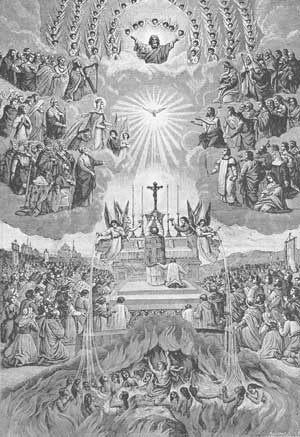 Maria,
can you now tell us what are the most effective means to help deliver
the souls in Purgatory?
Maria,
can you now tell us what are the most effective means to help deliver
the souls in Purgatory?
The most efficient means is
the Mass.
Why
the Mass?
Because it is Christ who
offers Himself out of love for us. It is the offering of Christ Himself
to God, the most beautiful offering. The priest is God's representative,
but it is God Himself who offers Himself and sacrifices Himself for us.
The efficacy of the Mass for the deceased is even greater for those who
attached great value to the Mass during their lives. If they attended
Mass and prayed with all their hearts, if they went to Mass on weekdays
— according to their time available — they drew great profit from
Masses celebrated for them. Here, too, one harvests what one has sown.
A
soul in Purgatory sees very clearly on the day of his funeral if we
really pray for him, or if we have simply made an act of presence to
show we were there. The poor souls say that tears are no good for them:
only prayer! Often they complain that people go to a funeral without
addressing a single prayer to God, while shedding many tears; this is
useless!
Earthly
sufferings
There is another
means, very powerful, to help the poor souls: the offering of our
sufferings, our penances, such as fasting, renunciations, etc., — and
of course, involuntary suffering, like illness or mourning.
Maria, you have been invited many times to suffer for the poor souls, in
order to deliver them. Can you tell us what you have experienced and
undergone during these times?
The first time, a soul asked
me if I wouldn't mind suffering for three hours in my body for her, and
that afterwards I could resume working. I said to myself: "If it
will all be over after three
hours, I could accept it." During those three hours, I had the
impression that it lasted three days, it was so painful. But at the end,
I looked at my watch, and I saw that it had only lasted three hours. The
soul told me that by accepting that suffering with love for three hours,
I had saved her twenty years of Purgatory!
Yes, but why did you suffer for only three hours to avoid twenty years
of Purgatory? What did your sufferings have that was worth more?
It is because suffering on
earth does not have the same value. On earth, when we suffer, we can
grow in love, we can gain merits, which is not the case with the
sufferings in Purgatory. In Purgatory, the sufferings serve only to
purify us from sin. On earth, we have all the graces. We have the
freedom to choose.
All of this is
so encouraging because it gives an extraordinary meaning to our
sufferings. The suffering which is offered, voluntary or involuntary,
even the smallest sacrifices we can make, suffering or sickness,
mourning, disappointments... if we live them with patience, if we
welcome them in humility, these sufferings can have an unheard-of power
to help souls.
The best thing
to do, Maria tells us, is to unite our sufferings to those of Jesus, by
placing them in the hands of Mary. She is the one who knows best how to
use them, since often we ourselves do not know the most urgent needs
around us. All this, of course, Mary will give back to us at the hour of
our death. You see, these sufferings offered will be our most precious
treasures in the other world. We must remind each other of this and
encourage each other when we suffer.
Let me add
something important: the souls in Purgatory can no longer do anything
for themselves; they are totally helpless. If the living do not pray for
them; they are totally abandoned. Therefore, it is very important to
realize the immense power, the incredible power that each one of us has
in our hands to relieve these souls who suffer.
We wouldn't
think twice about helping a child who has fallen in front of us from a
tree, and who had broken his bones. Of course, we would do everything
for him! So, in the same way, we should take great care of these souls
who expect everything from us, attentive to the slightest offering,
hopeful for the least of our prayers, to relieve them from their pain.
And it might be the finest way to practice charity.
Maria, why can one no longer gain merits in Purgatory, when one can on
earth?
Because at the moment of
death, the time to earn merits is over. For as long as we are living on
earth, we can repair the evil we have done. The souls in Purgatory envy
us of this opportunity. Even the angels are jealous of us, for we have
the possibility of growing for as long as we are on earth.
But often, the suffering in our lives leads us to rebellion, and we have
great difficulty in accepting and living it. How can we live suffering
so that it bears fruit?
Sufferings are
the greatest proof of the love of God, and if we offer them well, they
can win many souls.
But how can we welcome suffering as a gift, and not as a punishment (as
we often do), as a chastisement?
We must give everything to
Our Lady. She is the one who knows best who needs such and such an
offering in order to be saved.
We should not
always consider sufferings as a punishment. It can be accepted as
expiation not only for ourselves, but above all for others. Christ was
innocence itself, and He suffered the most for the expiation of our
sins. Only in Heaven will we know all that we have obtained by suffering
with patience in union with the sufferings of Christ.
Maria, do the souls in Purgatory rebel when faced with their suffering?
No! They want to purify
themselves; they understand that it is necessary.
What is the role of contrition or repentance at the moment of death?
Contrition is very
important. The sins are forgiven, in any case, but there remains the
consequences of sins. If one wishes to receive a full indulgence at the
moment of death — that means going straight to Heaven — the soul has
to be free from all attachment.
Maria, I would like to ask you: at the moment of death, is there a time
in which the soul still has the chance to turn towards God, even after a
sinful life, before entering into eternity — a time, if you like,
between apparent death and real death?
Yes, yes! The Lord gives
several minutes to each one in order to regret his sins and to decide: I
accept, or I do not accept to go and see God. Then we see a film of our
lives.
I knew a man who believed in
the Church's teachings, but not in eternal life. One day, he fell
gravely ill and slid into a coma. He saw himself in a room with a board
on which all his deeds were written, the good and the bad. Then the
board disappeared as well as the walls of the room, and it was
infinitely beautiful. Then he woke up from his coma, and decided to
change his life.
Maria, does the devil have permission to attack us at the moment of
death?
Yes, but man also has the
grace to resist him, to push him away. So, if man does not want anything
to do with him, the devil can do nothing.
Maria, what advice would you give to anyone who wants to become a saint
here on earth?
Be very humble. We must not
be occupied with ourselves. Pride is evil's greatest trap.
Maria, please tell us: can one ask the Lord to do one's Purgatory on
earth, in order not to have to do it after death?
Yes.
I knew a priest and a young woman who were both ill with tuberculosis in
the hospital. The young woman said to the priest: "Let's ask the
Lord to be able to suffer on earth as much as necessary in order to go
straight to Heaven." The priest replied that he himself didn't dare
to ask for this. Nearby was a religious sister who had overheard the
whole conversation. The young woman died first, the priest died later,
and he appeared to the sister, saying: "If only I had had the same
trust as the young woman, I too would have gone straight to
Heaven."
Maria, are there different degrees in Purgatory?
Yes, there is a great
difference of degree of moral suffering. Each soul has a unique
suffering, particular to it; there are many degrees.
Maria, are the sufferings in Purgatory more painful than the most
painful sufferings on earth?
Yes, but in a symbolic way.
It hurts more in the soul.
Maria, you know, many people today believe in reincarnation. What do the
souls tell you concerning this subject?
The souls say that God gives
only one life.
But some would say that just one life is not enough to know God and to
have the time to be really converted, that it isn't fair. What would you
reply to them?
All people have an interior
Faith (conscience); even if they do not practice, they recognize God
implicitly. Someone who does not
believe — that doesn't exist! Each soul has a conscience to recognize
good and evil, a conscience given by God, an inner knowledge — in
different degrees, of course, but each one knows how to discern good
from evil. With this conscience, each soul can become blessed.
What happens to people who have committed suicide? Have you ever been
visited by these people?
Up to now, I have never
encountered the case of a suicide who was lost — this doesn't mean, of
course, that that doesn't exist — but often, the souls tell me that
the most guilty were those around them, when they were negligent or
spread calumny.
At this moment,
I asked Maria if the souls regretted having committed suicide. She
answered yes. Often, suicide is due to illness. These souls do regret
their act because, as they see things in the light of God, they
understand instantly all the graces that were in store for them during
the time remaining for them to live — and they do see this time which
remained for them, sometimes months or years —– and they also see
all the souls they could have helped by offering the rest of their lives
to God. In the end, what hurts them most is to see the good that they
could have done but didn't, because they shortened their lives. But when
the cause is illness, the Lord takes this into account, of course.
Are
there priests in Purgatory?
Yes, there are many. They
didn't promote respect for the Eucharist. So Faith overall suffers. They
are often in Purgatory for having neglected prayer — which has
diminished their Faith. But there are also many who have gone straight
to Heaven.
What would you say, then, to a priest who really wants to live according
to the Heart of God?
I would advise him to pray
much to the Holy Spirit — and to say his Rosary every day.
Have you been visited by souls who, on earth, practiced perversions? I
am thinking, for example, about the sexual domain.
Yes, they are not lost, but
they have much to suffer to be purified. For example: homosexuality.
This truly comes from the Evil One.
What advice would you give, then, to all those people afflicted by
homosexuality, with this tendency in them?
Pray a lot for the strength
to turn away from it. They should above all pray to the Archangel
Michael; he is the great fighter par excellence against the Evil One.
What are the attitudes of heart which can lead us to losing our soul for
good, I mean going to Hell?
It is when the soul does not
want to go towards God, when it actually says: "I do not
want."
Jesus said that it was difficult for a rich person to enter into the
Kingdom of Heaven. Have you seen such cases?
Yes! But if they do good
works, works of charity, if they practice love, they can get there, just
like the poor.
What do you think of the practices of spiritism? For example: calling up
the spirits of the departed, Ouija-boards, etc.?
It is not good. It is always
evil. It is the devil who makes the table move.
What is the difference between what you are living with the souls of the
departed, and the practices of spiritism?
We are not supposed to
summon up the souls — I don't try to get them to come. In spiritism,
people try to call them forth.
This
distinction is quite clear, and we must take it very seriously. If
people were only to believe one thing I have said, I would like it to be
this: those who engage in spiritism (moving tables and other practices
of that kind) think that they are summoning up the souls of the dead. In
reality, if there is
<M>some response to their call, it is
always and without exception Satan and his angels who are answering.
People who practice spiritism (diviners, witches, etc.) are doing
something very dangerous for themselves and for those who come to them
for advice. They are up to their necks in lies. It is forbidden,
strictly forbidden, to call up the dead. As for me, I have never done
so, l do not do so, and I never will do so. When something appears to
me, God alone permits it.
(End of interview.)
 Today, June 26, we commemorate the feast day of Saint Josemaría Escrivá de Balaguer (1902-1975), priest, modern-day saint, and founder of Opus Dei, a Catholic institution dedicated to “helping
people turn their work and daily activities into occasions for growing
closer to God, for serving others, and for improving society.” Pope John Paul II said of this holy man,
“Saint Josemaría was chosen by the Lord to proclaim the universal call
to holiness and to indicate that everyday life, its customary
activities, are a path towards holiness. It could be said that he was
the saint of the ordinary."
Today, June 26, we commemorate the feast day of Saint Josemaría Escrivá de Balaguer (1902-1975), priest, modern-day saint, and founder of Opus Dei, a Catholic institution dedicated to “helping
people turn their work and daily activities into occasions for growing
closer to God, for serving others, and for improving society.” Pope John Paul II said of this holy man,
“Saint Josemaría was chosen by the Lord to proclaim the universal call
to holiness and to indicate that everyday life, its customary
activities, are a path towards holiness. It could be said that he was
the saint of the ordinary."




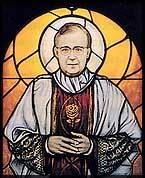









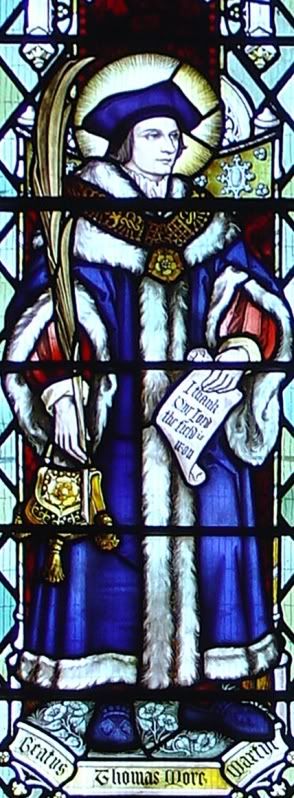








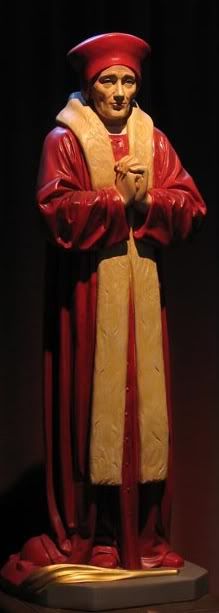







 Maria,
can you now tell us what are the most effective means to help deliver
the souls in Purgatory?
Maria,
can you now tell us what are the most effective means to help deliver
the souls in Purgatory?